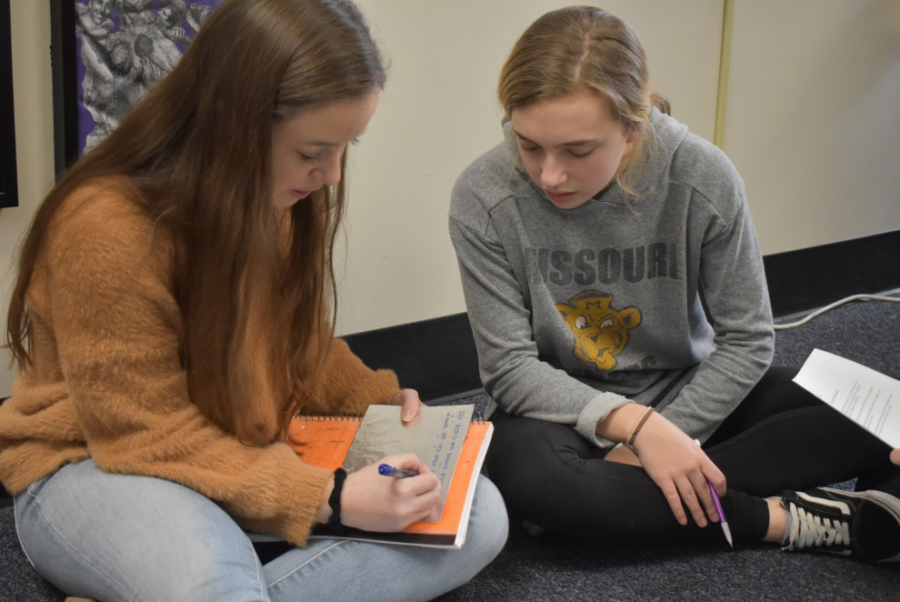Reading the works of classical authors like Cicero and translating, Latin students focus on bringing back Roman history. Labeled as “dead” and thought of as ancient or a language of the past, Latin teacher Tom Herpel works to keep it alive.
“I chose Latin because at the time I was studying for the spelling bee so I already had a bunch of Latin roots down,” senior Gokul Venkatachalam said. “I thought if it could help me in any way I would take it. It wasn’t super useful but that’s okay, I still enjoyed it in middle school.”
While Latin is vocally dead because modern populations do not speak the language, it still has value.
“Vatican City, the Pope and the priest actually speak Latin to one other. [It is] the official language of the Pope, and he makes all of his news conferences in Latin,” Herpel said. “It is a language that can be spoken if you so desire.”
Academically, the language is focused on being able to read it, write it and learning about Roman history, Roman culture and how that influences modern society.
“I’m not particularly concerned with the application of the language itself. I think people can take Spanish, German [or] French, and what I’ve seen is that they usually don’t even retain their language after two years. I guess any language in high school is functionally a dead language if you’re not going to use it,” Venkatachalam said. “In comparison, Latin offers a lot of interesting perspectives because you do a lot of culture studies, you study history and you examine the classics. It’s really interesting [when] you’re learning a language so old that you are translating the works of people who died so long ago and you’re learning how the times were through what they’re saying.”
Herpel believes that Latin is not dead and should be learned and investigated.
“If you think about it, doctors, they don’t study cadavers because they’re dead? People that work on car engines, they don’t look at those because they might be dead or not working? We learn a lot about things that don’t happen to be as movement oriented. You just need to look at it from a different perspective, and I think Latin is the exact same way.”
Latin students also get to work with artifacts from Ancient Rome.
“Mr. Herpel has done a lot of great things,” Venkatachalam said. “As a Latin 5 student, since we’ve mastered a lot of the language, we get to do a lot of hands-on stuff. We translate the works of ancient authors, we’ve been translating the works of Augustus right now. And then we create these themes [and] we watched a movie to talk about how language influences thought.”
Latin 3 students handled, washed and investigated Ancient Roman coins. They worked with a group called Ancient Coins for Education that gives students coins from the 400s.
“People think history is stationary and that it’s not changing, but the more that we find, the more that we learn. It changes our perspectives and our outlooks on the people that use this language and lived at that time,” Herpel said. “The textbook is almost alive, in the fact that it changes over time.”
They were able to see Roman armor used by soldiers.
“Understanding the big picture is something that’s really important and you need a multifaceted way of studying that and Latin is one of those facets,” Venkatachalam said.
Along with the actual language, Latin students learn about how people used it in their natural setting and can also use skills from the language in their daily life.
“I think [the] bigger picture that people don’t recognize is the way that Latin is structured. It’s a very problem-solving, mathematical language and it helps all skill acquisition. This means it’s going to help you learn how to memorize, it’s going to help you learn how to organize, it’s going to help you learn how to decipher [and] be able to problem-solve. The skills that you learn in Latin will help you wherever you go,” Herpel said.




![Smiling in a sea of Longhorns, Fox 2 reporter Ty Hawkins joins junior Darren Young during the morning Oct. 3 pep rally. The last time West was featured in this segment was 2011. “[I hope people see this and think] if you come to [Parkway] West, you will have the time of your life because there are so many fun activities to do that make it feel like you belong here. I was surprised so many people attended, but it was a lot of fun,” Young said.](https://pwestpathfinder.com/wp-content/uploads/2025/10/Edited2-1200x798.jpg)
![West High seniors and families listen as a representative of The Scholarship Foundation of St. Louis, Teresa Steinkamp, leads a Free Application for Federal Student Aid (FAFSA) workshop. This session, held in the library, provided guidance on financial aid, scholarships and student loan options. “This event is very beneficial for any seniors who are applying to or considering applying to colleges after high school [because] the cost of college is on the rise for seniors and parents,” college and career counselor Chris Lorenz said.](https://pwestpathfinder.com/wp-content/uploads/2025/09/DSC_4478-1200x778.jpg)
![Senior Kamori Berry walks across the field during halftime at the Homecoming football game on Sept. 12. During the pep assembly earlier that day, she was pronounced Homecoming Queen. “I thought it was nice that the crowd [started] cheering right away. I know [my friends] were really excited for me, and my family was happy because typically non-white people don't win,” Berry said.](https://pwestpathfinder.com/wp-content/uploads/2025/09/DSC7046-Enhanced-NR-1200x798.jpg)



![Pitching the ball on Apr. 14, senior Henry Wild and his team play against Belleville East. Wild was named scholar athlete of the year by St. Louis Post-Dispatch after maintaining a high cumulative GPA and staying involved with athletics for all of high school. “It’s an amazing honor. I feel very blessed to have the opportunity to represent my school [and] what [it] stands for,” Wild said.](https://pwestpathfinder.com/wp-content/uploads/2025/05/unnamed-6-1200x714.jpg)
![The Glory of Missouri award recipients stand with their certificates after finding out which virtue they were chosen to represent. When discovering their virtues, some recipients were met with contented confirmation, while others, complete surprise. “I was not at all surprised to get Truth. I discussed that with some of the other people who were getting the awards as well, and that came up as something I might get. Being in journalism, [Fellowship of Christian Athletes and] Speech and Debate, there's a culture of really caring about truth as a principle that I've tried to contribute to as well. I was very glad; [Truth] was a great one to get,” senior Will Gonsior said.](https://pwestpathfinder.com/wp-content/uploads/2025/04/Group-Glory-of-Missouri.jpg)

